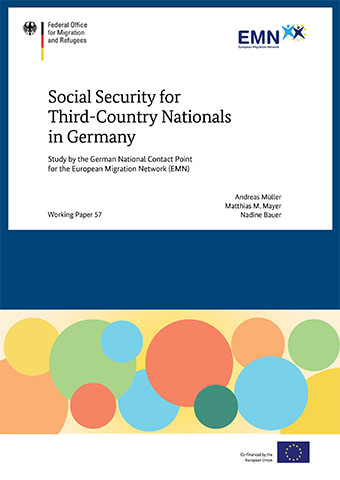Social Security for Third-Country Nationals in Germany ,
 Source: BAMF
Source: BAMF
The present study describes the structure and functioning of contribution-financed statutory social insurance as well as tax-financed social welfare systems in Germany. While the benefits of social insurance (statutory pension insurance and unemployment insurance, partially statutory health insurance) provide usually temporary coverage commensurate to social status calculated as a percentage of earned income, basic security benefits should ensure a sociocultural minimum living income.
The study analyses the conditions under which third-country nationals receive access to individual social benefits as well as the consequences of social security dependence for one’s residence status. Access to social benefits is partially excluded for third-country nationals; however, in those cases, where access is provided, claiming basic security benefits can result in consequences to the residence status, depending on the residence title.
In the context of increasing cross-border mobility, the portability of social benefit claims poses a migration-specific challenge for modern welfare states. In order to provide legal stability in this area and prevent the mobility-based loss of insurance claims, Germany has concluded a number of bilateral social insurance agreements with third countries.
The social coverage of third-country nationals is practically depicted in three case studies that link various social emergencies with different residence conditions.
The Working Paper 57 was drawn up by the National Contact Point of the European Migration Network (EMN) at the Federal Office for Migration and Refugees as the German contribution towards a comparative European study of third-country nationals’ access to social security.
Authors: Dr. Andreas Müller, Matthias M. Mayer und Nadine Bauer

